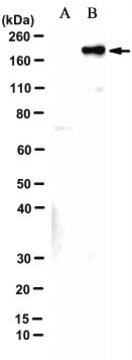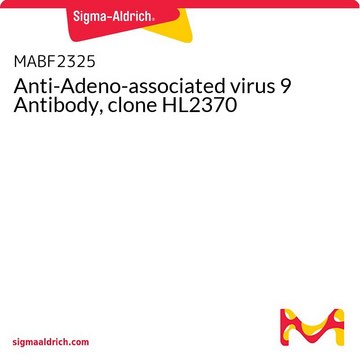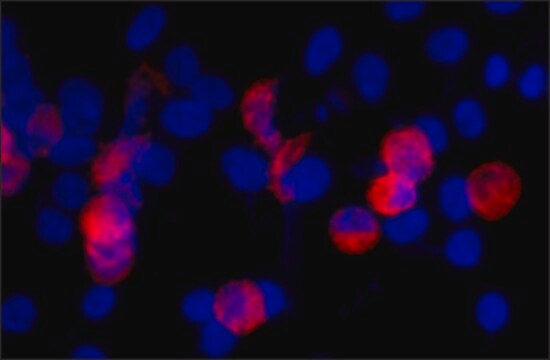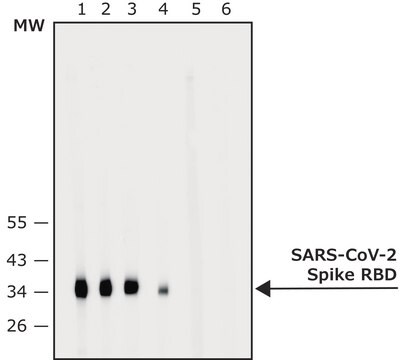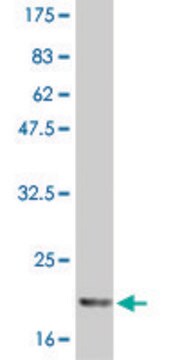MABF3090
Anti-SARS-CoV-2 Spike N501Y Antibody, clone 6D4-E2
Sinónimos:
S glycoprotein Alpha N501Y, Spike glycoprotein Alpha N501Y
About This Item
Productos recomendados
origen biológico
mouse
Nivel de calidad
forma del anticuerpo
purified antibody
tipo de anticuerpo
primary antibodies
clon
6D4-E2, monoclonal
mol peso
calculated mol wt 141.18 kDa
observed mol wt ~200 kDa
purificado por
using protein G
reactividad de especies
virus
envase
antibody small pack of 100 μL
técnicas
immunoprecipitation (IP): suitable
western blot: suitable
isotipo
IgG1κ
secuencia del epítopo
N-terminal half
Nº de acceso UniProt
temp. de almacenamiento
2-8°C
Información sobre el gen
vaccinia virus ... S(43740568)
Especificidad
Inmunógeno
Aplicación
Evaluated by Western Blotting in lysate from HEK293T cells transiently transfected with SARS-CoV-2 spike B.1.351, beta.
Western Blotting Analysis: A 1:500 dilution of this antibody detected SARS-CoV-2 spike protein with N501Y mutation in lysate from HEK293T cells transiently transfected with SARS-CoV-2 spike B.1.351, Beta, but not in wild-type HEK293T cells.
Tested Applications
Western Blotting Analysis: A representative lot detected SARS-CoV-2 spike N501Y in HEK293T transiently transfected with various SARS-CoV-2 variants (Data courtesy of Stefan Schüchner and Egon Ogris (Max Perutz Labs, Medical University of Vienna, Austria).
Immunoprecipitation Analysis: A representative lot detected SARS-CoV-2 spike N501Y in Whole cell lysates of HEK293T cells (untransfected or transiently transfected with SARS-CoV-2 spike WT or B.1.351 variant) (Data courtesy of Stefan Schüchner and Egon Ogris (Max Perutz Labs, Medical University of Vienna, Austria).
Note: Actual optimal working dilutions must be determined by end user as specimens, and experimental conditions may vary with the end user
Descripción de destino
Forma física
Reconstitución
Almacenamiento y estabilidad
Otras notas
Cláusula de descargo de responsabilidad
¿No encuentra el producto adecuado?
Pruebe nuestro Herramienta de selección de productos.
Código de clase de almacenamiento
12 - Non Combustible Liquids
Clase de riesgo para el agua (WGK)
WGK 1
Punto de inflamabilidad (°F)
Not applicable
Punto de inflamabilidad (°C)
Not applicable
Certificados de análisis (COA)
Busque Certificados de análisis (COA) introduciendo el número de lote del producto. Los números de lote se encuentran en la etiqueta del producto después de las palabras «Lot» o «Batch»
¿Ya tiene este producto?
Encuentre la documentación para los productos que ha comprado recientemente en la Biblioteca de documentos.
Nuestro equipo de científicos tiene experiencia en todas las áreas de investigación: Ciencias de la vida, Ciencia de los materiales, Síntesis química, Cromatografía, Analítica y muchas otras.
Póngase en contacto con el Servicio técnico